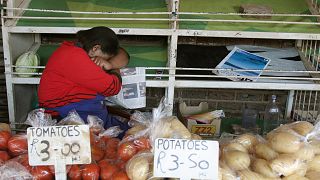Kenya
A restaurant in Nairobi is skimping on the size of its chapatis — a flaky, chewy Kenyan flatbread — to save on cooking oil as food prices rise.
Food prices have been rising gradually in Kenya since 2022.
Drought added to food shortages and increased prices arising from the impact of war in Ukraine, and costs have stayed stubbornly high ever since.
Small restaurants, such as the one owned Cedrik Shamalla are suffering as they struggle to feed customers and also make a profit.
Shamalla said he had been forced to stretch the number of chapatis he used to make on the same amount of flour.
Maize flour is a staple food in most Kenyan households as it is used to make a corn meal which is commonly known as ugali.
"I have tried rationing the portion of chapati or ugali and still things are not adding up because of the high cost of living," he said.
"With one bundle of wheat flour I could make 25 chapatis and now am making 35 and the customers are complaining."
Shamalla says the price of all commodities have gone up, not just maize flour but cooking oil also.
Around the world, food prices are persistently, painfully high. Puzzlingly, too.
On global markets, the price of grains, vegetable oil, dairy and other agricultural commodities has fallen steadily for months.
But the relief hasn’t made it to the real world of shopkeepers, street vendors and families trying to make ends meet.
According to a report released by the Agriculture and Food Authority of Kenya, prices remain high because millers bought wheat when the food prices in the world were high.
Kenyan millers have also been contending with high production costs arising from bigger fuel bills.
Regina Ngina, a grocery shop owner in Nairobi, says she has been forced to cut down on her daily meals and reduce her stock to make ends meet.
"I drink tea without milk in the morning and skip lunch," she says. "I only have dinner so that I can be able to save. I am even having challenges paying school fees for my kids."
Elvis Nagisenga, the owner of a retail shop where he sells basic household commodities, including cooking oil and flour has seen his profit margins drastically reduced.
"Last year we were making a profit of Ksh,20 ($0.20) per bundle of cooking flour or more but now we are getting a profit of between Ksh,5 ($0.05) to Ksh,10 ($0.10) and that is not easy because people are not buying because of lack of money," Nagisenga says.
The price for a packet of maize flour has more than doubled over the past two years.
After the 2022 elections, President William Ruto ended subsidies meant to cushion consumers from higher prices.
He has promised nonetheless to bring down corn flour prices.













00:22
Boniface Kariuki, a Kenyan mask vendor shot at close range laid to rest
Go to video
Ruto's $9M mega church sparks outrage amid Kenya's crisis
01:40
Kenya's president defiant, backs security forces after deadly protests
01:05
"Shoot in the leg": Ruto orders Kenyan police to curb protest vandalism
Go to video
First Malaria treatment for babies approved
01:49
Broken windows and lootings: Nairobi businesses deal with protest aftermath